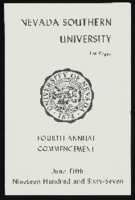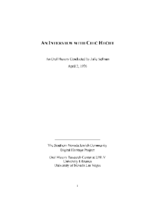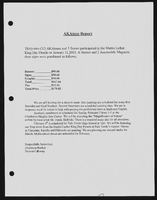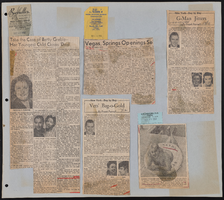Search the Special Collections and Archives Portal
Search Results
Benedict Family Papers
Identifier
Abstract
The Benedict Family Papers materials date from roughly 1905-1998 and are comprised of correspondence and letters (1969-1971) written to Howard Hughes by the public. The collection also contains correspondence written to Robert Maheu, former chief executive of Nevada operations for Howard Hughes. The collection also includes a variety of casino and gambling related product catalogs, gaming guides for Las Vegas casinos, and of research papers and reports primarily relating to sports betting and cheating.
Archival Collection

Nevada Southern University 4th commencement program
Date
Archival Collection
Description
Commencement program from University of Nevada, Las Vegas Commencement Programs and Graduation Lists (UA-00115).
Text
Eileen Brookman Photographs
Identifier
Abstract
The Eileen Brookman Photographs depict Nevada Assemblywoman Eileen Brookman from 1959 to 1989. The photographs primarily depict Brookman with other Nevada politicians, including U.S. Senators Harry Reid, Alan Bible, Eugene McCarty, and Howard Cannon, and Nevada Governors Paul Laxalt, Mike O’Callaghan, Richard Bryan, and Grant Sawyer. The photographs also depict Brookman at political events with the Nevada National Guard, bill-signing ceremonies, and at events in Las Vegas, Nevada.
Archival Collection

Nadine Cracraft oral history interview: transcript
Date
Archival Collection
Description
Oral history interview with Nadine Cracraft conducted by Barbara Tabach on November 27, 2017 for the Remembering 1 October Oral History Project. In this interview, Nadine Cracraft discusses the development of her career in child and family therapy after moving to Las Vegas, Nevada in 1991. While describing the work she has done, Cracraft talks about the volunteer counseling services she provided for the survivors of the October 2017 Las Vegas mass shooting. She specifically mentions working with Aria staff members who were struggling with the aftermath of the shooting as well as her time spent working with First Friday to help those impacted by the traumatic event. Throughout the interview, Cracraft explains the different ways people manage their post-traumatic stress disorder and how this knowledge influenced her care of the survivors.
Text

Jimmy Lee oral history interview: transcript
Date
Archival Collection
Description
Oral history interview with Jimmy Lee conducted by Vanessa Concepcion, Kristel Peralta, and Stefani Evans on May 25, 2021 for Reflections: The Las Vegas Asian American and Pacific Islander Oral History Project. Jimmy shares his family's history as entertainers and producers in Korea and their migration to the United States when Jimmy was six years old. He talks about their move to Durham, North Carolina and their relocation to Las Vegas, his education, and his current business, mentorship, and philanthropic pursuits. Subjects discussed include: Arirang Sisters; Jo Mackey Sixth Grade Center; Nevada's tax structure; Commercial Center.
Text

Transcript of interview with Chic Hecht by Julie Sefman, April 2, 1976
Date
Archival Collection
Description
Interview with Chic Hecht Julie Sefman on April 2, 1976. In this brief interview, Hecht talks about his time in the state senate working to bolster the budget with sales tax and gaming tax, starting a community college and health programs. He also talks about Pop Squires, a newspaper man and advocate for building Hoover Dam, who had a home on the site of Chic Hecht's clothing store on Fremont Street. Hecht also describes his time in the military and his involvement with the Military Intelligence Association.
Text

University of Nevada, Las Vegas (UNLV) College of Business and Economics Diploma Ceremony program
Date
Archival Collection
Description
Commencement program from University of Nevada, Las Vegas Commencement Programs and Graduation Lists (UA-00115).
Text

Alpha Kappa Alpha Sorority, Theta Theta Omega Chapter AKAteens reports
Date
Archival Collection
Description
From the Alpha Kappa Alpha Sorority, Incorporated, Theta Theta Omega Chapter Records (MS-01014) -- Chapter records file.
Text


